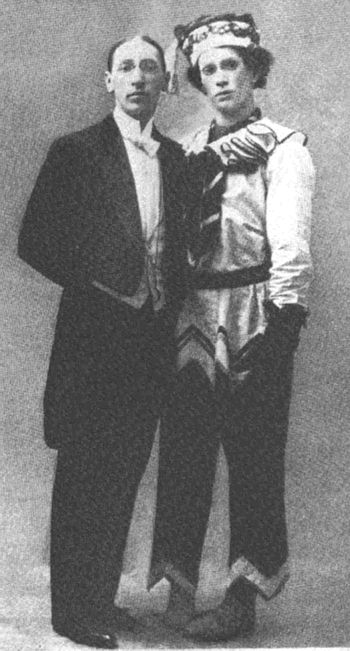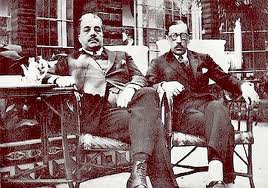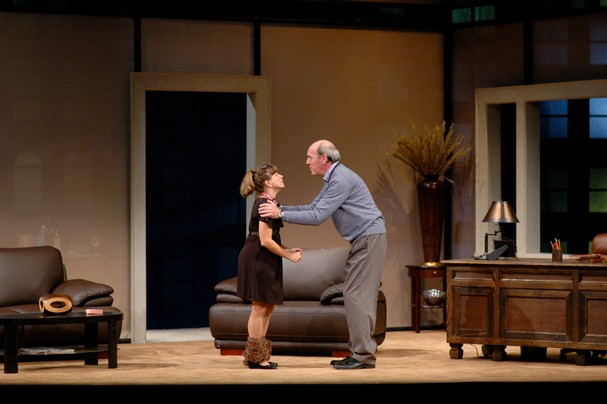This week’s video: Louis Prima and Keely Smith sing “That Old Black Magic”:
(This is the latest in a weekly series of arts-related videos that appear in this space each Wednesday.)
Archives for 2011
TT: Almanac
“A fellow of mediocre talent will remain a mediocrity, whether he travels or not; but one of superior talent (which without impiety I cannot deny that I possess) will go to seed if he always remains in the same place.”
Wolfgang Amadeus Mozart, letter to Leopold Mozart, Sept. 11, 1778
TT: For Floridians only
If you should happen to be in or near the Winter Park-Orlando area of Florida, I’ll be speaking about Duke Ellington at Rollins College tonight at seven p.m. under the auspices of the Winter Park Institute. Here’s part of the press release:
Teachout started writing his sixth book, Black Beauty: A Life of Duke Ellington, in the spring of 2010. The finished manuscript is due in 2013. What happens between now and then? In this exclusive progress report on the writing of Black Beauty, Teachout takes you inside his workshop and tells the inside story of how he is sculpting the public and private lives of a great artist into a large-scale narrative biography….
For more details, go here.
TT: Just because
Duke Ellington and his orchestra perform “Satin Doll” in 1962:
TT: Almanac
“If I have gone higher than others in advertising, or done more, the fact is not due to exceptional ability, but to exceptional hours. It means that a man has sacrificed all else in life to excel in this one profession. It means a man to be pitied, rather than envied, perhaps.”
Claude C. Hopkins, My Life in Advertising
TT: Adventures of a peripatetic librettist
 After spending two happy weeks in Florida, I headed up to Delaware on Saturday morning to attend back-to-back staged workshop performances of Danse Russe, the new opera about the making of The Rite of Spring that Paul Moravec and I are writing for Philadelphia’s Center City Opera Theater. The first one took place on Saturday evening at the rehearsal studios of OperaDelaware in Wilmington, the second on Sunday afternoon in the auditorium of the Ethical Society of Philadelphia on Rittenhouse Square. As if that weren’t enough activity for one frenzied weekend, I also squeezed in a fast side trip to Philadelphia’s Arden Theatre to see their new revival of Eugene O’Neill’s A Moon for the Misbegotten, which I’ll be reviewing for The Wall Street Journal in a couple of weeks.
After spending two happy weeks in Florida, I headed up to Delaware on Saturday morning to attend back-to-back staged workshop performances of Danse Russe, the new opera about the making of The Rite of Spring that Paul Moravec and I are writing for Philadelphia’s Center City Opera Theater. The first one took place on Saturday evening at the rehearsal studios of OperaDelaware in Wilmington, the second on Sunday afternoon in the auditorium of the Ethical Society of Philadelphia on Rittenhouse Square. As if that weren’t enough activity for one frenzied weekend, I also squeezed in a fast side trip to Philadelphia’s Arden Theatre to see their new revival of Eugene O’Neill’s A Moon for the Misbegotten, which I’ll be reviewing for The Wall Street Journal in a couple of weeks.
Part of the process of writing an opera for Center City Opera Theater involves presenting public workshop performances at which the members of the audience are invited to comment on what they’ve just seen. We got quite a few valuable suggestions after both performances of Danse Russe. A playwright who saw the show in Wilmington told me, for instance, that the character of Sergei Diaghilev, the legendary ballet impresario who commissioned The Rite of Spring, wasn’t active enough–everybody in the opera talks about him, but you never see him at work backstage. This was an astute comment, and precisely the kind of mistake that an inexperienced playwright (i.e., me) is prone to make.
 A minute or two after the playwright spoke up, the light went on and I said to Paul, “It just hit me–Diaghilev doesn’t have an aria of his own, and I think he really needs one.” I blush to confess that I made the same mistake in writing the libretto for The Letter: we didn’t give Pat Racette’s character an all-alone-on-stage moment at any point in the first draft of the opera. As soon as Pat pointed that fact out, I saw our mistake, and Paul and I went straight to the studio and wrote her big aria.
A minute or two after the playwright spoke up, the light went on and I said to Paul, “It just hit me–Diaghilev doesn’t have an aria of his own, and I think he really needs one.” I blush to confess that I made the same mistake in writing the libretto for The Letter: we didn’t give Pat Racette’s character an all-alone-on-stage moment at any point in the first draft of the opera. As soon as Pat pointed that fact out, I saw our mistake, and Paul and I went straight to the studio and wrote her big aria.
The point of this story is, of course, that theater in all its forms is both empirical and collaborative. An opera or play must work on stage. Furthermore, you don’t know what works or doesn’t work until you get the show in front of an audience, and it’s essential at that point that you be open to other people’s ideas about how to make it work better. If you bring a my-way-or-the-highway attitude into the rehearsal studio, you’re going to crash and burn. Paul and I, by contrast, are completely comfortable about being frank with one another, and when smart people make suggestions, we listen–hard. That’s why we’re getting so much out of Center City’s workshop-and-talkback process, which has already made Danse Russe a much better piece and will undoubtedly continue to do so.
I’m pleased to say, though, that we also got our fair share of praise as well. The compliment I appreciated most came from Lena Ryepkina, our excellent and exceedingly nice pianist, who was born in Kiev. Lena told me that I’d gotten all the Russia-related details right, and asked in all innocence whether I spoke Russian. I confessed to being a hopeless monoglot, to which she replied, “Then how did you know to make Diaghilev say ‘сукин сын’?” (That’s Russian for “son of a bitch.”) I confessed, much to her amusement, that I’d gotten it out of a James Bond novel.
I’d accumulated quite a pile of notes by the time that Sunday’s performance was over, as had Paul. Alas, I’ve not yet had any time to go to work on them. In fact, I didn’t even have time for dinner on Sunday: I went straight to the hotel, checked in, walked over to the Arden to see A Moon for the Misbegotten, then grabbed a quick bite to eat after the show and returned to the hotel for a much-needed night’s rest.
 Wilmington, by the way, has a first-class downtown hotel, and Paul and I both had the good fortune to stay there on Saturday night. The Hotel du Pont is, to put it mildly, no ordinary hotel: it shares a building with DuPont’s corporate headquarters and a Broadway-sized theater called, logically enough, the DuPont Theatre. After dining on the hotel’s much-praised Sunday brunch, we were given a tour of the facilities, which also include a Versailles-style ballroom and a dining room on whose walls hang a half-dozen or so museum-quality Andrew Wyeth watercolors. I’m still trying to ratchet my jaw back into place. The life of an itinerant opera librettist and drama critic is full of unexpected pleasures!
Wilmington, by the way, has a first-class downtown hotel, and Paul and I both had the good fortune to stay there on Saturday night. The Hotel du Pont is, to put it mildly, no ordinary hotel: it shares a building with DuPont’s corporate headquarters and a Broadway-sized theater called, logically enough, the DuPont Theatre. After dining on the hotel’s much-praised Sunday brunch, we were given a tour of the facilities, which also include a Versailles-style ballroom and a dining room on whose walls hang a half-dozen or so museum-quality Andrew Wyeth watercolors. I’m still trying to ratchet my jaw back into place. The life of an itinerant opera librettist and drama critic is full of unexpected pleasures!
By the time you read these words, I’ll be on my way to Winter Park, Florida, where it’s warmer–a lot warmer, I’m glad to say. I’ll be giving a talk about my Duke Ellington biography tomorrow night at Rollins College, about which more here, then driving down to West Palm Beach to see yet another show, about which more in due course. As always, watch this space for details!
TT: Almanac
“But of course acting is not truth. You can’t pretend that it is. An effect is an effect, whether you like it or not.”
John Gielgud (interviewed by John Miller in John Gielgud: An Actor’s Life)
TT: She’s a real dog
In today’s Wall Street Journal drama column I report on a show I saw last week in Fort Myers, Florida Rep’s revival of Sylvia, and take note of the Broadway transfer of The Importance of Being Earnest, which I was supposed to see on Wednesday afternoon. Here’s an excerpt.
* * *
 Cleverness, like cuteness, is in the eye of the beholder, so let me start by saying that A.R. Gurney’s “Sylvia,” which is being performed with terrific comic energy by the Florida Repertory Theatre, is both clever and cute in all the right ways. First seen in New York a decade and a half ago, Mr. Gurney’s droll tale of a dog who comes between a middle-aged man and his frustrated wife has long since become a regional-theater staple, as well it should be. Not only is “Sylvia” one of the funniest small-cast plays of the past quarter-century, but just beneath the surface it has serious things to say about the travails of what one of the characters calls “the dangerous years…the years between the first hint of retirement and the first whiff of the nursing home.” Moreover, Mr. Gurney says them so amusingly that you almost fail to notice the sharp bite of the medicine of truth.
Cleverness, like cuteness, is in the eye of the beholder, so let me start by saying that A.R. Gurney’s “Sylvia,” which is being performed with terrific comic energy by the Florida Repertory Theatre, is both clever and cute in all the right ways. First seen in New York a decade and a half ago, Mr. Gurney’s droll tale of a dog who comes between a middle-aged man and his frustrated wife has long since become a regional-theater staple, as well it should be. Not only is “Sylvia” one of the funniest small-cast plays of the past quarter-century, but just beneath the surface it has serious things to say about the travails of what one of the characters calls “the dangerous years…the years between the first hint of retirement and the first whiff of the nursing home.” Moreover, Mr. Gurney says them so amusingly that you almost fail to notice the sharp bite of the medicine of truth.
The trick to “Sylvia” is that the title character, a stray poodle-Labrador mix, is played by a young woman (Michelle Damato) who is capable of conversing with her master (Gordon McConnell) and mistress (Carrie Lund) when no one else is around to eavesdrop. Greg, who found her in the park one day, is deep in the throes of a work-related midlife crisis. Accordingly, he falls for Sylvia in much the same way that another man might fall for a younger woman, much to the horror of Kate, his wife, who didn’t want a dog in the first place and really doesn’t want one on whom her husband dotes to the exclusion of everyone else, Kate included. Stir in a third actor (Chris Clavelli) who plays three smaller roles, two of them in drag, and you get a recipe for Gurney-style comedy…
Ms. Damato is entirely delightful in the canine role created Off Broadway by Sarah Jessica Parker in 1995. Her frisky body language and dead-sure comic timing couldn’t be bettered. Not that her colleagues are anything other than right on the button: Here as in the two previous Florida Rep shows I’ve seen, you get the feeling that you’re watching a permanent ensemble at work on stage, one whose members know and trust one another….
Speaking of drag acts, the smartest one ever to come my way is currently doing business in Manhattan: The Roundabout Theatre Company has brought to Broadway Brian Bedford’s brilliantly zany Stratford Shakespeare Festival staging of Oscar Wilde’s “The Importance of Being Earnest,” in which the veteran classical comedian dons wig and gown to play Lady Bracknell.
As I wrote in this space when I saw the production in Canada two summers ago, “I don’t care for camped-up drag acts, but Mr. Bedford, who makes himself up to look like Queen Victoria and carries himself like a snooty gargoyle, is giving us something completely different, an impersonation so sharp-witted and closely observed that it demands to be accepted on its own daring terms”…
* * *
Read the whole thing here.
